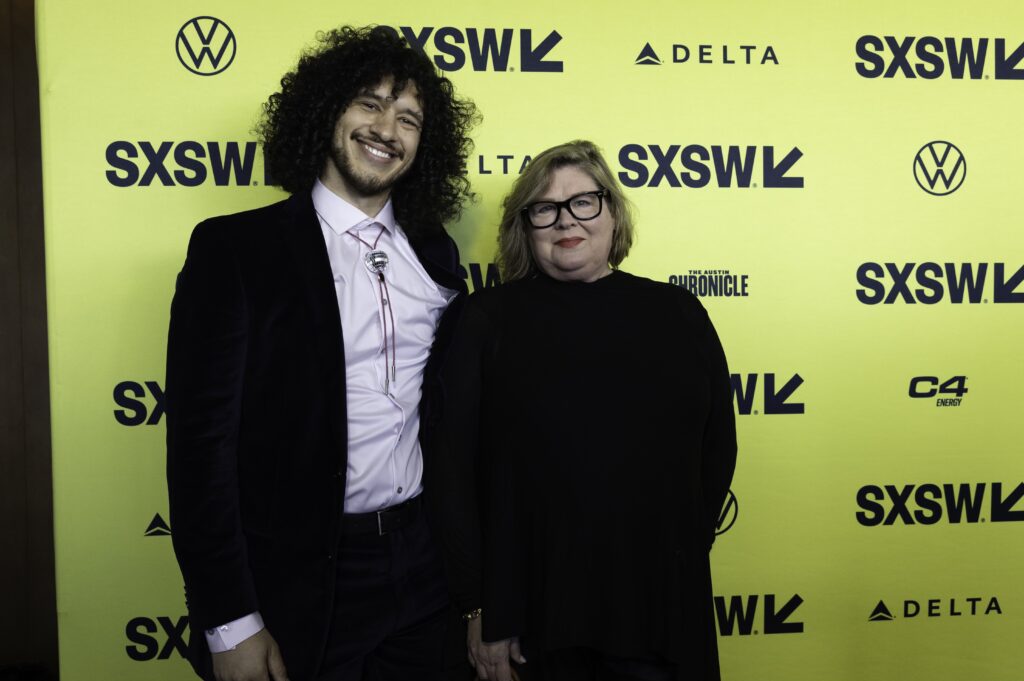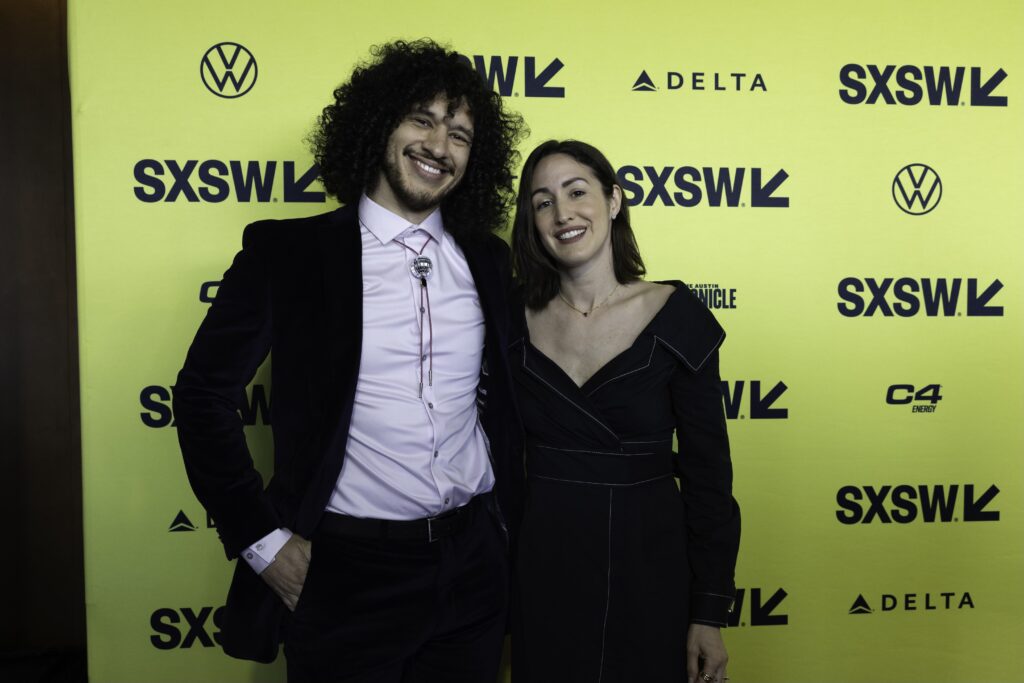Alum Rosa’s Career Continues to Line Up with ‘Bob Trevino’
Edgar Rosa ’12 was at the SXSW Film Festival this March when Bob Trevino Likes It, a film he produced, won the Grand Jury and Audience awards. The film follows a young woman searching for her estranged father, who ends up bonding with a different man with her father’s name.
Rosa spoke to Emerson Today about his Emerson experience, the “bread and butter” of his career, and “building the sandbox” as a producer. This conversation has been edited for length.

As producer of Bob Trevino Likes It, what did you do?
Rosa: I was brought in about February or March of last year. I was part of every part of the process: [looking at and hiring] various actors, to budgeting and scheduling the project as we kind of got ready at soft prep. Then I was the lead producer of putting the project together in Kentucky, hiring and firing (ready to go, not firing people), and getting the pieces together. I was the lead person in charge of money, and making sure the flow of the cash from investors to the project was accurate and consistent.
We were a three-headed monster: Tracie Laymon was the writer, director, and producer, and she was the one who [led the push] for Barbie Ferriera to be in the lead role. Sean Mullin was the money guy, coordinating and organizing the financial logistics in getting the money. Then I was in charge of spending the money.
Did you go to South by Southwest (SXSW)? What was that experience like?
It was the first time I’ve been to South by Southwest. The [SXSW] experience was really, really special. [SXSW] takes over the Austin area and you’re really immersed into film, and tech and music melds together in a crazy two-week festival. It was really beautiful to be part of that and receive recognition for the film. I think with every film festival it’s exciting to see the films. I know Emerson had strong representation at this year’s festival, and always does because Emersonians are everywhere. It was a really special environment, and for us to win at the festival was huge.
How did your Emerson experience help you personally/professionally?
Rosa: Emerson was the start of everything. My entire film career, and my love of producing — I owe a lot of it to my start at Emerson. I think being in Boston was really special because it is a college town. I was immersed into a world with all these people who are also passionate about making movies and telling stories, and that was instrumental in getting me in the mindset to be a filmmaker. Prior to college, in high school, it was a hobby. At Emerson, I saw it holistically as a job and career.
The best thing at Emerson offered to me was to be able to rent and use equipment my first semester. … It was incredible to have access to student organizations where I could rent equipment… and shoot stuff on my own, and connect with people in my dorm who were also filmmakers. The smallest film organization still had hundreds of people who are dedicated and passionate. [Emerson Independent Video] is always making movies. Emerson Channel is always at the forefront of what’s new and fresh. NBS [National Broadcast Society] is leader of narrative storytelling. The EVVYs. When people see I went to Emerson, it clicks, and they know I have the baseline knowledge and that’s super crucial.
Emerson catered itself to supporting a young and indie filmmaker. Having that access and ability early was so crucial in my success. I had to fail a million times and make bad movies to make a good movie. I really loved that experience of experimentation that Emerson offered.
For Bob Trevino Likes It, you were a producer, and you’ve been a line producer for numerous other projects. Do you have a preference of what you’d like to do on movies/TV?
Rosa: Line producing is my bread and butter. I really, really love scheduling, budgeting, and the general logistics of putting a movie together. I found it was a very important niche, because there aren’t a lot of people who like doing that. A lot of people do the creative stuff, or they want to direct or write. … As a producer, I learned I would be best served doing the financial and logistics part. That’s its own creative endeavor. Money isn’t infinite. You need to create structure and boundaries around a piece of art.
The way I think about it in my head — it is a sandbox to provide guidelines…. There are so many different areas to play in that sandbox. I love building that sandbox. After Bob Trevino, I see how my experience as a line producer can benefit me become a more holistic lead producer. …As a lead producer, it allows me more control over the stories I want to tell.
I’ve become knowledgeable about tax credits, which is important in film because in the U.S., each state has a different tax incentive to make a film. Each state has different rules and regulations.

What are your future professional goals?
Rosa: To win an Academy Award, right? Through work with my business partner [Marie Alyse Rodriguez], we’re currently developing and looking to build a slate -through our company, Purple Intuition – of films to tell stories of marginalized people you don’t normally see. Bob Trevino is first. We want to highlight parts of the world that need that exposure. I’m at a point in my career I can give those projects an opportunity to pitch to companies that can provide funding and support.
We want to be on forefront of telling inspirational and unique revolutionary stories of this new generation and making sure we have representation on everything. That’s a mandate for us as business partners. We’re making sure we have representation in front [of] and behind the screen.
There are so many people and stories who don’t have representation on both sides of the camera. That is so important. If we’re telling stories about Black people, we need to have representation, or if it’s about disabled folks, women, and other marginalized communities. We’re been very fortunate in the last few years to have at least 50 percent representation, and we’re looking at having 70-90 percent representation on our projects. Sometimes it’s a difficult and awkward conservation, especially with White people. But I’m open to having it because it’s the conversation that needs to be had.
What would you ask yourself if you were interviewing yourself?
Rosa: I’ve always loved the question of what would I tell a younger version of myself, if I could go back and have a moment with 21-year-old Edgar, who is just graduating Emerson. I think as I have reflected back on that time, my exit from Emerson and growth into my career in LA, and AFI Conservatory, and at ELA, I would say that the advice I’d give is to continue to put my head down.
I think I was nervous coming out of undergrad that I hadn’t spent enough time socializing or networking within the Emerson community. I felt that I had worked too much or [was] looking too far ahead of me instead of around me. I think what I would tell a younger version of myself, is that I was on the right path and trust my gut because I think even at 21, I knew what I needed to do. And to trust myself and continue working and continue hustling. And to give it my all. Emerson very much taught me to highlight and recognize talent around me. I was able to take that mantra when I moved out to LA.
Categories